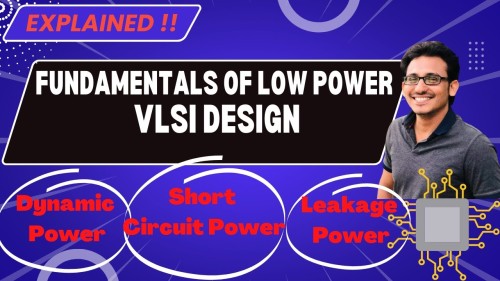Fundamentals Of Low-Power Vlsi Design

Fundamentals Of Low-Power Vlsi Design
Published 11/2025
Created by Electronics Zone
MP4 | Video: h264, 1280x720 | Audio: AAC, 44.1 KHz, 2 Ch
Level: All | Genre: eLearning | Language: English | Duration: 14 Lectures ( 2h 29m ) | Size: 1.1 GB
From Theortical Essential Techniques to Practice with Verilog Lab and a Power-Optimization Assignment
What you'll learn
Analyze the four types of power consumption: Switching, Glitch, Short-Circuit, and Leakage.
Implement 6 key power-saving techniques: Clock Gating, Operand Isolation, Multi-Voltage, Frequency Scaling, Multi-Vt, and Power Gating.
Code a production-ready Clock Gating cell in Verilog HDL through a hands-on lab.
Architect power-aware systems using Voltage Domains, Power Gating with retention flops, and Isolation Cells.
Optimize a complete design by applying multiple techniques in a final power-reduction assignment.
Requirements
Basic Knowledge of Digital Logic Design: Familiarity with fundamental concepts like Boolean algebra, combinational and sequential logic (flip-flops, latches), and finite state machines.
Fundamentals of Verilog HDL: A basic understanding of Verilog for RTL design (e.g., module definition, assignments, always blocks, and testbenches) is highly recommended for the hands-on coding lab.
Familiarity with CMOS Transistor Operation: A conceptual understanding of how CMOS transistors (both NMOS and PMOS) function as switches is helpful for grasping the origins of leakage and short-circuit power.
Description
In the rapidly evolving world of semiconductor design, power efficiency has become a critical metric, as important as performance and area. Whether for battery-operated mobile devices, high-performance computing, or IoT edge nodes, the ability to design low-power circuits is no longer a niche skill but a fundamental requirement for every VLSI engineer.This comprehensive course, "Mastering Low-Power VLSI Design," is designed to provide you with a deep, practical understanding of power consumption in digital circuits and the proven techniques to minimize it. We move beyond theoretical concepts to deliver actionable knowledge you can apply directly to your projects and designs.The course is structured into two core sections. First, we lay a solid foundation by demystifying the very nature of power consumption. You will gain a clear understanding of the four key components: Dynamic (Switching) Power, the main battery drain; Glitch Power, the unnecessary work caused by timing mismatches; Short-Circuit Power, the brief current path during signal transitions; and Leakage Power, the silent power drain that occurs even when the chip is idle.In the second section, we dive into the industry-standard power reduction techniques. You will learn the intricacies of Clock Gating, Operand Isolation, Multi-Voltage Domains, Frequency Scaling, Multi-Threshold Voltage (MVT) strategies, and advanced Power Gating. The learning is reinforced with practical, hands-on components, including a Verilog HDL lab where you will design and implement a clock gating cell, and a final assignment that challenges you to optimize a design using multiple techniques, simulating a real-world power optimization task.This course is ideal for VLSI and Digital Design Engineers, FPGA developers, Hardware Engineering Students, and anyone preparing for technical interviews in the semiconductor industry. By the end of this course, you will be equipped with the skills to analyze, quantify, and significantly reduce power consumption in your digital designs, making you a more valuable and effective engineer in the competitive tech landscape. Enroll today and start building the efficient electronics of tomorrow!
Who this course is for
VLSI / Digital Design Engineers looking to specialize in low-power design.
Electrical Engineering & Computer Science students preparing for a career in chip design.
FPGA developers wanting to transition to ASIC design or improve power efficiency.
Hardware enthusiasts with the foundational knowledge above who are curious about how modern chips manage power.
https://rapidgator.net/file/0a473f3c751928de578bd00aadc915ac/Fundamentals_of_Low-Power_VLSI_Design.part2.rar.html
https://rapidgator.net/file/e1a1d161e9ecf7ccb280afb47fcee79d/Fundamentals_of_Low-Power_VLSI_Design.part1.rar.html

Information
Users of Guests are not allowed to comment this publication.



